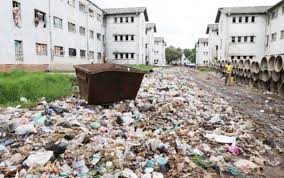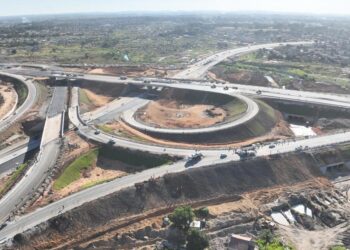A cock-tail of measures to deal with solid waste management challenges choking the country, especially in urban areas, is being put together by Government with imminent promulgation of a legal instrument to make the National Clean Up Programme compulsory for both the public and private sectors.
Good management of solid waste is critical to the health and well-being of urban residents with their very high densities and inability to follow the example of a farmer who can bury household garbage in a small corner of the farm.
In all the country cities and towns several tonnes of garbage are left uncollected on the streets each day, acting as a feeding ground for pests that spread disease, clogging drains and creating a myriad of related health and infrastructural problems.
However, the tasks of solid-waste management present complex technical challenges.
They also pose a wide variety of administrative, economic, and social problems that must be managed and solved.
Addressing journalists during the 2nd Post Cabinet Briefing last night, Information, Publicity and Broadcasting Services Minister Dr Jenfan Muswere outlined the raft of measures adopted by the Government as presented by Environment, Climate and Wildlife Minister Nqobizitha Mangaliso Ndlovu.
He said Cabinet considered and adopted measures to address the solid waste management challenges across the country, especially in urban areas.
“Cabinet highlights that the deplorable state of cleanliness across the country, particularly in urban areas is due to local authorities’ ineptitude and negligence in collecting and managing solid waste disposal,” said Minister Muswere.
The central Government has made interventions to redress the situation, including introduction of the National Clean Up Campaign in 2018 and declaration of a State of Disaster in Harare Metropolitan Province this year.
“An emergency solid waste management programme is currently being implemented under the State of Disaster declaration,” he said.
Noting that the mismanagement of solid waste persists, the Minister said Cabinet approved measures to curb the unsustainable accumulation of the waste, which include promulgation of a Statutory Instrument that will make the National Clean Up Programme compulsory for Government ministries, departments and agencies, local authorities, the business sector, vendors, retailers and manufacturers.
The local authorities will be required to localise the SI by promulgation of the relevant by-laws.
“Funds collected by Local Authorities from residents for waste management will be ring-fenced in-order to ensure that the authorities do not divert the funds to other uses, with the Environmental Management Agency supervising the use of the funds.
“Deterrent fines for public littering will be introduced and enforced, and repeat offenders charged with no option of a fine but given mandatory community service,” he said.
The Minister also said road and rail authorities will be compelled to ensure that road and rail servitudes are litter-free, and to undertake regular clean ups along the servitudes and at lay-bys, while public transport vehicles that dump waste along roads shall be fined up to Level 8 with the responsible transport operator or owner also being liable.
In addition, Minister Muswere said all political parties have been directed to mobilise their constituents to remove their campaign materials from the environment and ensure that it is properly disposed of with the assistance of local authorities.
“That massive awareness and education programmes and be undertaken, starting with a re-launch of the National Clean Up Programme in order to embed a mindset against littering and general disorder,” he said.
“In the medium-term, more efficient usage and disposal of plastic carrier bags and PET containers will be promoted in order to address the challenge of plastic waste.
“Long-term measures include increased waste recycling business and introduction of levies to deter the importation of materials such as plastics and disposable nappies whose management of post-consumer use is problematic.”
Minister Muswere said the education curriculum will also have deliberate learning programmes on cleanliness and management of waste from the lowest levels going up.
The near collapse of garbage removal in the four Harare Metropolitan councils prompted President Mnangagwa in August this year to declare a “state of disaster” the poor waste management that has seen ever-growing piles of garbage going uncollected for months with mounds of rubbish becoming common in most shopping centres and residential areas.
The declaration overtakes the legal municipal independence for local services enjoyed by Harare and Chitungwiza, and the near independence by Epworth and Ruwa local boards, and thus allows the central Government to move in.
A similar declaration allowed the central Government to move in a while ago and take over road reconstruction and maintenance, again normally a pure local government function if the local authorities are even modestly efficient.
For the rubbish the Environmental Management Agency was designated as the lead central government agency to co-ordinate and enforce efficient rubbish removal.
Harare Metropolitan Province is made up of Harare, Chitungwiza, Epworth and Ruwa, the first, third, fifth and seventh most populated urban centres in Zimbabwe.
The declaration was published in terms of the Civil Protection Act under Statutory Instrument 140 of 2023 cited as the Civil Protection (Declaration of State of Disaster: Emergency Solid Waste Management Harare Metropolitan Province) Notice, 2023.
According to SI 140, Government “noted with great concern the deplorable state of cleanliness of the Harare Metropolitan Province, characterised among other things by litter and waste dumps accumulating in business and residential areas of the province, open burning of garbage and indiscriminate illegal dumping of solid waste and littering”.
The SI added that the local authorities in the province were unable to manage their waste due, among other reasons, to their failure to invest in waste management infrastructure, and the related equipment and human resources along with their inefficient collection practices and lack of environmental control systems.
For the duration of the state of disaster, the minister responsible for environment will confer powers to the Environmental Management Agency to coordinate activities to manage waste within the province.
While the declaration is in force, the agency has a five-fold function to co-ordinate the efforts to the four local authorities, have the illegal dumps removed, waste regularly collected from all premises, the local authorities put in public bins in streets and public places, and run intensive education campaigns.
Going into detail on each function, the agency will “co-ordinate the use of materials and services made available by local authorities within the Harare Metropolitan Province during the state of disaster”.
Source Zimsituation










